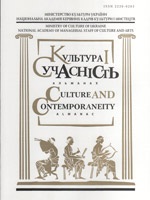Socio-cultural measures of legal culture
DOI:
https://doi.org/10.32461/2226-0285.1.2019.179685Keywords:
legal culture, culture, law, values, socio-cultural development of society, the formation of the legal culture of the individualAbstract
Purpose of the article is to study the socio-cultural conditions, character, ways, methods, and direction of the formation of legal culture, cultural norms and values as socio-cultural mechanisms for the formation of legal culture. The methodology of the research lies in using the method of culturological analysis, complex and holistic approaches, that allows outlining the socio-cultural problematics of legal culture in the socio-cultural environment, to highlight its essential measurements and aspects. The scientific novelty of the paper lies in reasoning the cultural norms and values as socio-cultural mechanisms for the formation of legal culture. Conclusions. The article studies socio-cultural conditions, character, ways, methods, and directions of the formation of legal culture, cultural norms and values as socio-cultural mechanisms for the formation of legal culture. It is outlined that legal culture is a multi-valued characteristic of one of the most important aspects of the life of society, which includes both the settled values, including the ones in the field of law, and various legal institutions and behavioral relations in the field of state and legal issues. The author attempts to ground the cultural norms and values as socio-cultural mechanisms for the formation of legal culture.
References
Выготский Л.С. Собрание сочинений в 6-ти т. Т.5 Основы дефектологии / Под редакцией Т. А. Вла- совой. — Москва: Педагогика , 1983. 368 с.
Жигулин А. А. Правовая культура личности как форма правосознания / А. А. Жигулин // Террито- рия науки. 2012. ғ 3. С. 98-106.
Загальна теорія держави і права / за ред. акад. АПрН України, докт. юрид. наук, проф. В.В.Копєйчикова. К. : Юрінком, 1997. 320 с.
Коваленко І. П. Правова соціалізація особистості як процес формування правової культури / І. П. Коваленко// Культура України. Вип. 32, 2011. С.110-117.
Скакун О. Ф. Теoрія держави і права: підручник / О. Ф. Скакун; пер. з рос. Х.:Консум, 2009. 656 с.
Херпфер Христиан О международной научно-исследовательской программе «Всемирное изучение ценностей» и Всемирной ассоциации по изучению цінностей / Христиан Херпфер // Социология : научно- теоретический журнал. Белорусский государственный университет. 2013. ғ 4. С. 33-41.
Grossfeld В. The Strength and Weakness of Comparative Law. Oxford. 1990. P. 41.
Hofstede G.Cultures and organizations: Software of the mind. Boston: McGraw-Hill. 2004. P.5.
Kohler N. Das Recht als Kulturerscheinung, Wurtzburg. 1885. S. 5.
1.Vygotskij L.S., Vlasova T.A. (Red.) (1983). Coll. of works. Fundamentals of defectology. Moscow, Pedagogy. Vol.5, p. 197. [in Russian].
Zhigulin A. A. (2012). Legal culture of the person as a form of legal awareness. Territory of Science, 3, 98-
[in Russian].
Kopejchikov V. V. (1997) (Eds.). Common theory of state and law. Kyiv, Yurinkom. [in Ukrainian].
Kovalenko І. P. (2011). Legal socialization of personality as a process of formation of legal culture. Culture of Ukraine, 32, Kharkiv State Academy of Culture, Kharkiv. [in Ukrainian].
Skakun O. F. (2009). Theory of State and Law. Textbook. Kharkiv, Consum. [in Ukrainian].
Herpfer, Hristian (2013). About the international research program "World study of values" and the World Association for the Study of Values. Sociology. Belarusian State University, 4, 33-41. [in Belarusian].
Grossfeld, В (1990). The Strength and Weakness of Comparative Law. Oxford. p. 41.
Hofstede, G. (2004). Cultures and organizations: Software of the mind. Boston, McGraw-Hill, p.5.
Kohler, N. (1885). Das Recht als Kulturerscheinung, Wurtzburg. p. 5.
Downloads
Published
Issue
Section
License

This work is licensed under a Creative Commons Attribution 4.0 International License.
Authors who publish with this journal agree to the following terms:
- Authors retain copyright and grant the journal right of first publication with the work simultaneously licensed under a Creative Commons Attribution License that allows others to share the work with an acknowledgement of the work's authorship and initial publication in this journal.
- Authors are able to enter into separate, additional contractual arrangements for the non-exclusive distribution of the journal's published version of the work (e.g., post it to an institutional repository or publish it in a book), with an acknowledgement of its initial publication in this journal.
- Authors are permitted and encouraged to post their work online (e.g., in institutional repositories or on their website) prior to and during the submission process, as it can lead to productive exchanges, as well as earlier and greater citation of published work (See The Effect of Open Access).


